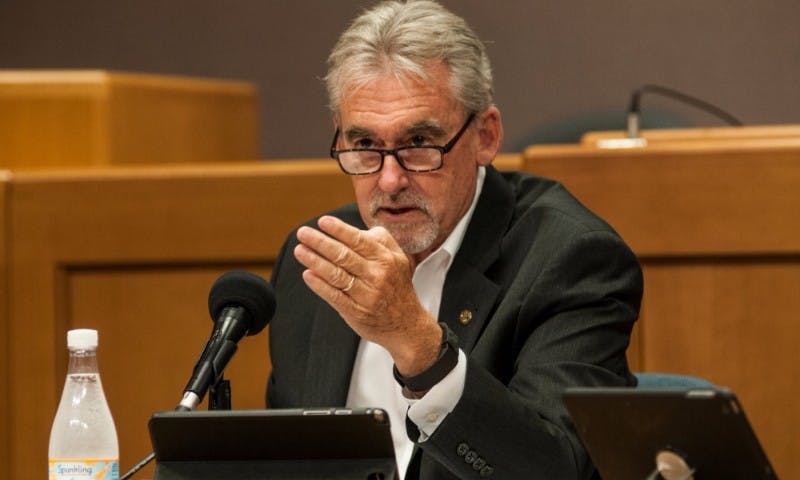The East Lansing City Council was not at full strength on Tuesday night as two of its members — Mayor Mark Meadows and council member Ruth Beier — began extended leaves of absence, a fact that could have major consequences on the city's ability to function for the near future.
The two members had requested and were approved for a leave of absence at the last general meeting on Aug. 14, according to the synopsis of that meeting. Beier will be absent from Aug. 15 to Dec. 31, and Meadows from Aug. 16 to Oct. 1.
“What the mayor and councilwoman Beier have put us in a position of doing is, not doing the business of this city for two months. I find that unacceptable,” said council member Shanna Draheim.
Despite voting to approve the leaves of absence, Draheim said in the past two weeks she had come to understand that three votes were still needed for approval, meaning all votes of the short-staffed council must be unanimous until Meadows returns if council hopes to pass anything.
“What it means for today is that if you happen to see a motion fail despite two votes in favor and only one opposed, that is what’s going on,” said Mayor Pro Tem Erik Altmann, who is acting as mayor in Meadows' absence.
Draheim said she felt the council had been misled. She said the city charter did not specify a leave of absence for council members — only permission to miss meetings.
This became an issue as council moved to set up a public hearing for an ordinance regarding the zoning of medical marijuana provisioning centers. While council set a hearing for Oct. 16, Draheim said she believed the ordinance would fail as a result of the missing council members, although Meadows will have returned by then.
“The reality is we are a very dynamic council. Our votes are sometimes five and zero, sometimes three and two, sometimes four and one, and they vary by who is sitting at this table,” Draheim said.
Another point of controversy in the wake of the council members' time off was how to handle an ordinance to restructure how residents and non-residents alike park in East Lansing.
The language in the ordinance describes two “permit areas” with different parking rules. These zones were chosen due to their proximity to Michigan State University’s campus, and “the propensity of persons attending Michigan State University to park on nearby East Lansing city streets ... causing a shortage of reasonably available and convenient parking for residents.”
“This ordinance standardizes residential permit parking by basically stating that residential permit parking will be in effect so that non-residents are limited to two hours of parking,” said City Attorney Thomas Yeadon.
The ordinance would redraw the city’s current permit parking map to include neighborhoods adjacent to MSU’s campus.
“It’s based on looking at the parking regimes in about a dozen other college towns, mostly Big Ten Universities, I looked at. What were they doing? How did they do it? And it’s generally a mix of exactly this type of parking control order,” Draheim, who proposed the ordinance, said.
Altmann, who said potentially "thousands of people" would be affected by the proposed change, felt the plan was perhaps too ambitious to schedule a public hearing for October.
“Essentially it repeals all our parking control orders in several neighborhoods, I think, and replaces them with something that we haven’t tried yet locally,” Altmann said. “A lot of people will be affected by this, every household in the affected neighborhoods ... because how the street works and looks in front of their house will change.”
The original date of the parking ordinance public hearing was changed to Nov. 7, in order to gather more data before discussing the ordinance with the public.
Support student media!
Please consider donating to The State News and help fund the future of journalism.
Discussion
Share and discuss “Short-staffed city council deals with discord at Tuesday's meeting” on social media.







